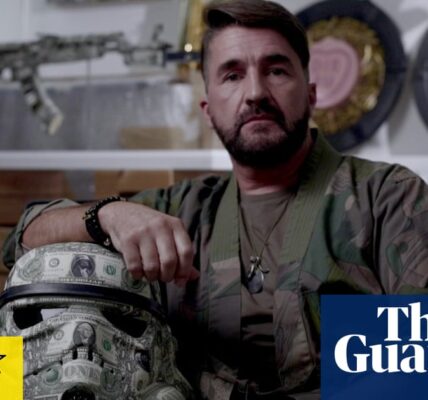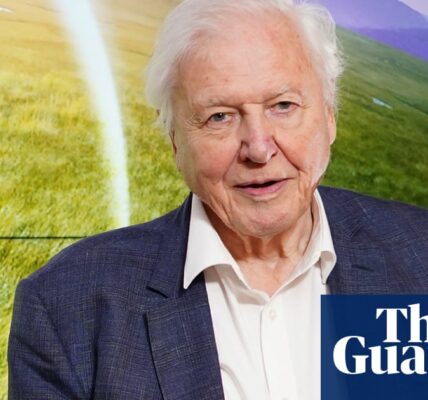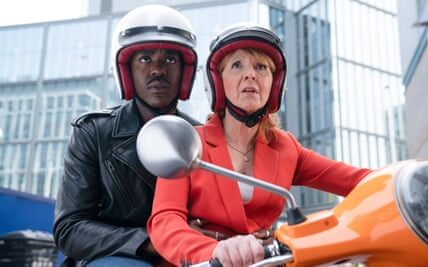‘They got their knives out and just started stabbing’: when Putin attacked Greenpeace
The sun had barely risen on 18 September 2013 when Sini Saarela started to worry she might drown. The climate activist was trying to occupy Prirazlomnaya – a bright red oil platform in Russia’s Pechora Sea – and things were getting tough. Workers were using water cannon to stop her and colleague Marco Weber climbing up, crushing them under a relentless torrent of freezing cold water. He was showing signs of hypothermia.
“That was a frightening experience,” Saarela says today, on a video call from her home in Finland. It certainly looks that way in new BBC documentary On Thin Ice: Putin vs Greenpeace. The addictive six-part series tells the inside story of the Arctic 30, a group of Greenpeace activists who set out to halt work at the first offshore oil rig in the Russian Arctic, and ended up pawns in Vladimir Putin’s power struggle with the west. Edited from footage shot by the 28 activists and two journalists on board (some of it smuggled out of prison), it is this moment, as Saarela hangs off the edge of Prirazlomnaya, when the show kicks into gear.
The ordeal that followed saw the group face gun-toting coastguards, get their boat seized by FSB officers and spend two months in Russian jail for a crime they didn’t commit. “Surreal” is how Saarela describes it. “I was waiting for someone to come and be like: ‘Yeah, we’re kidding!’”
The protest had been months in the making. Conceived as a way to draw attention to expanding oil extraction in the Arctic, it was led, in part, by Frank Hewetson, a maritime operation specialist from London (banned in three countries and arrested in many more for his work with Greenpeace) and Dima Litvinov, a Soviet Union-born, Sweden-based campaigner who, at the time, was chairman of the board of Greenpeace Russia.
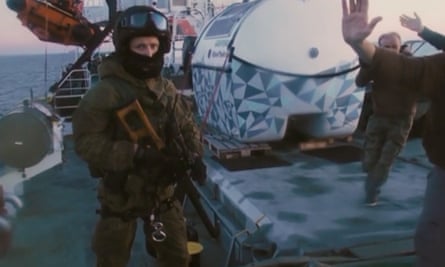
The plan was for their crew to approach the rig by boat. Once nearby, a team would board a rib, race to it and attempt to hoist a waterproof pod on to the platform, where two activists could live for several days. To Litvinov, it felt like essential work. “At that point, we had already found four times more oil, gas and coal than we could afford to burn without causing a complete catastrophe for the climate,” he says. “To open up new frontiers, to look for more, it [seemed] insane.”
Watching the documentary now, after a decade of stories about Russia spreading misinformation and invading its neighbours, it’s hard not to wonder if the group were naive in planning such a protest on Putin’s turf. They were western activists trying to disrupt production of Russia’s most valuable resource; did they not expect serious retaliation? Especially given the months leading up to it had seen the violent arrest of local activists such as Pussy Riot?
“The short answer is no,” says Litvinov. The experts he talked to, and his previous work in Russia, led him to believe that “either nothing would happen or it would be a situation where we get arrested, towed to shore, kept for a few days and thrown out”. Hewetson adds that “part of the shock of how we were treated” was that Greenpeace had attempted the same occupation at the same rig 12 months before, and the coastguard “did literally nothing”.
That was not the case this time. As the group set about occupying the drilling platform – run by majority Russian-state owned energy giant Gazprom – Russian coastguards rammed their boats into Hewetson and his team, brandishing guns and firing warning shots into the water, dangerously close to the rig. “They got their knives out and just stabbed the sides of our [inflatable] boats immediately – pop, pop, pop,” says Hewetson.
Soon Saarela and Weber were arrested. Locked up on the coastguard’s ship, the now 42-year-old says she was worried. She could hear the Russian maritime security firing their cannon at the Arctic 30 but was unable to tell if they were threatening her fellow activists or striking their boat. “I would try to read their faces, like: ‘OK, would they look like this if 28 people just died?’” Within 24 hours, balaclava-clad military police had boarded the Greenpeace ship via helicopter, taking control illegally as it remained in international waters. “I was running up the stairs to the bridge then they knocked me down on top of Frank,” says Litvinov. “It was a surprise how controlling they were, the size of their guns, the uniforms, no IDs, covered faces … the efficiency.”
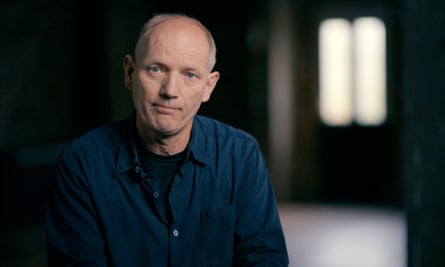
Hewetson adds: “I think the most atrocious act they did was they raided the stores [where we keep the alcohol]. I remember thinking: ‘You’re armed and you’re pissed?!’”
It took five days for the boat to reach the Russian coastal town of Murmansk. The crew spent that time trapped in the mess, still confident that their stay in Russia would only last a couple of days before deportation. Once they reached court and heard they were being charged with piracy – a crime that comes with a 15-year sentence in Russia – and that they would be held for two months of pre-trial detention, it was devastating. “Then I felt fear,” says Saarela. “I [had] the realisation of fully losing control: it doesn’t matter what you say or what you do, it doesn’t have any effect on whether you’re going to get out.”
On Thin Ice: Putin vs Greenpeace adds context to Saarela’s anxieties. Interviews with Russians who played a part in the Arctic 30’s arrest reveal Putin’s involvement. Igor Volobuev, former head of communications for Gazprom, says the president chose to make an example of the activists to prove his strength. The local media ran smear stories about the crew, such as that they were carrying a bomb and that police found heroin on the boat. Greenpeace engages in this political tennis. Campaigners stage protests at events sponsored by Gazprom. Paul McCartney is enlisted to write a letter to Putin. (He’s apparently the only western celebrity with influence in Russia.)
after newsletter promotion
What was life like in prison for the activists while all this was going on? Isolated, they say. The women of the Arctic 30 were kept in solitary confinement. The men were in shared cells but separated from each other. They got one hour’s exercise a day, in a cell that “had a wire cover on top so you couldn’t see the sky but the rain could still get in”, says Litvinov.
Despite having been jailed before, 59-year-old Hewetson found Russian prison hard. He was racked with guilt about what his team were going through and haunted by the prospect of spending 15 years incarcerated, away from his wife and two teenage daughters. “Twenty-three hours a day you’re left to your own thoughts, your own fears,” he says. He remembers one particularly bad night when he found it hard not to go into a “spiral of despair”. “The immediate fear I had was losing it in front of my two cellmates,” he says.
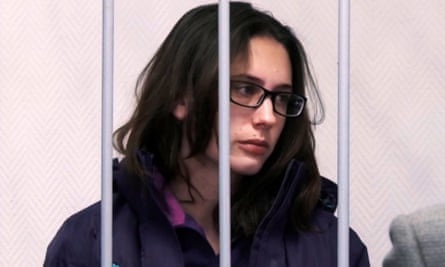
One of the most heartbreaking scenes sees the activist given tokens to call his family, only to find they barely last seconds each. “It was a nightmare,” he says, of shoving coin after coin into the payphone, hardly managing to comfort his sobbing daughter before the line cut out. “It felt like torture.”
For Saarela, the most “worrisome” moment came when the group’s charges were changed from piracy, which seemed far-fetched, to hooliganism, which Putin was using to convict political activists. A switch flicked in her. “In the end, I was not afraid, I was angry,” she says. “I felt that it was an injustice, what happened to us and other activists in Russia.”
The group were eventually released on bail in November 2013, ahead of a ruling from the International Tribunal for the Law of the Sea that found the FSB’s boarding of the Greenpeace boat was illegal. A month later, the group were among a number of activists, including Pussy Riot, who were discharged as part of an amnesty before the Winter Olympics in Sochi. “The first breath of freedom was wonderful,” says Litvinov. He thinks the group were lucky to have been released: “We were the canary in the mine. Our arrest came at exactly that breaking point from moving away from the previous ‘free’ Russia regime to [it] going rogue.” It’s something Hewetson thinks about a lot these days. “I’m constantly watching Russia on the news. I’m obsessed with what’s happening in Ukraine,” he says.
All three activists are still passionate environmental campaigners. They say the experience in Russia changed them. For Saarela, now a mother of two, it transformed her life. “Before, I felt quite desperate in terms of fighting climate change. I was anxious. But when we went into prison and the support [we got], people starting to act for the Arctic and the climate, it really gave me hope.” Does she regret taking part? “Never. That’s what gave me strength in prison: I knew I had done the right thing.”
On Thin Ice: Putin vs Greenpeace is on BBC Two on 9 June at 9pm.
Source: theguardian.com
